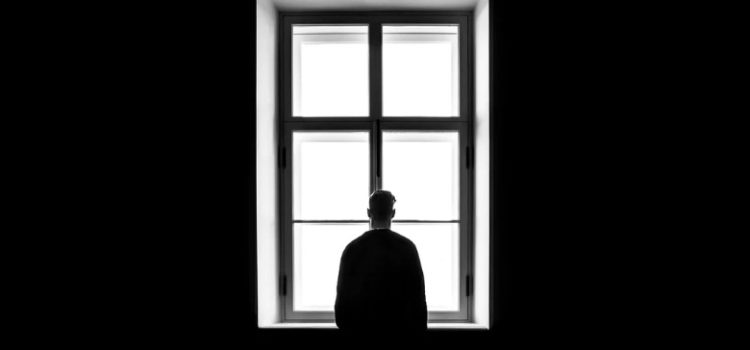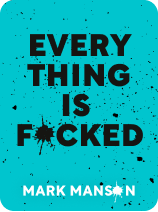

This article is an excerpt from the Shortform book guide to "Everything Is F*cked" by Mark Manson. Shortform has the world's best summaries and analyses of books you should be reading.
Like this article? Sign up for a free trial here.
What does hopelessness feel like? Why is it so hard to find hope sometimes?
According to Mark Manson’s book Everything Is F*cked, hopelessness feels like a painful, meaningless existence, leading to a life filled with either constant pursuit of pleasure or apathy and depression. He further explores why it’s difficult to find hope, including how being alive can be traumatic.
Read on to learn about what hopelessness feels like and why hope can be hard to find, according to Manson.
What Does Hopelessness Feel Like?
In his book Everything Is F*cked, Mark Manson explains that we all begin life without hope: As young children, we lack the ability to imagine the future, so we can’t comprehend the idea of doing something unpleasant for a greater purpose. Instead, we try our best to move toward immediate pleasure and away from immediate pain. But, what does hopelessness feel like as we mature in life? You may assume that as soon as our brains develop enough to imagine a better future, we’ll learn how to hope. Unfortunately, for most people, hope is not this easy to attain.
We’ll explain what hopelessness feels like and why it’s difficult to find hope, according to Manson.
| When Do Children Learn to Hope? Research shows that children can learn to imagine the future at around age four, although some three-year-olds develop this ability early. By Manson’s logic, this should also be the time when children can learn to hope. However, experts have found that at this stage of development, children typically struggle to imagine the future if it’s likely to be significantly different than the present. Specifically, one study found that if they were thirsty, children were much more likely to imagine that they would rather have water tomorrow than pretzels. This may help explain why children can’t always find hope, as Manson claims, even after they learn to imagine the future. If a child is doing something unpleasant, like eating vegetables, they’re likely to have trouble imagining a future in which their present pain has paid off and they feel great. |
Life Without Hope Is Painful
Manson states that hopelessness feels like a painful, meaningless existence to many people. For those who feel hopeless, Manson claims they must endure one of two suffering-filled life experiences: First, they may try to distract themselves by relentlessly pursuing pleasure. Unfortunately, pleasure is a fleeting experience, and they’ll spend their lives desperately trying to feed an insatiable craving.
(Shortform note: Constantly seeking pleasure creates long-term suffering even on a neurochemical level. In Dopamine Nation, Anna Lembke explains that when you regularly indulge in highly pleasurable activities for a long enough period, your brain adapts and interprets that level of pleasure as a neutral baseline. Then, when you stop indulging in that pleasure, your brain interprets the default state of existence to be painful—at least for the two to four weeks before your brain restores balance. This is one of the main drivers of addiction.)
Second, Manson explains that because of what hopelessness feels like, people may try to numb the pain of existence by suppressing all their emotions. This kind of hopelessness manifests as apathy and depression—instead of relentlessly trying to feed a craving, people lack the motivation to do anything at all, languishing at a baseline of dull pain. These two life experiences are becoming more common, contributing in large part to today’s mental health crisis.
(Shortform note: It’s important to distinguish between trying to suppress your emotions and separating yourself from your emotions. Experts claim that, although they seem similar, the latter is a healthy strategy that allows you to see your emotions as they truly are: fleeting sensations in the body, not an inherent part of you. The key difference between the two approaches is that when you separate yourself from your emotions, you still allow yourself to feel them by focusing on the physical sensations in your body. In contrast, when you try to suppress your emotions, you take on the impossible task of forcing them to go away, which inevitably creates even more negative feelings as your failure to eliminate them makes you more angry and anxious.)
Why It’s Difficult to Find Hope
Now that we understand what hopelessness feels like, let’s explore why it’s also difficult to find hope, according to Manson. Hope is difficult to find because being alive is traumatic, says Manson. Not only is it inherently depressing that we’re all mortal, as we’ve discussed, but our chaotic and unfair world also inflicts a certain degree of senseless pain on everyone. Because of this, as we grow and attempt to construct a logical understanding of the world, we all come to believe (to varying degrees) that we deserve to suffer. In other words, we irrationally interpret the inherent pain of existence to mean that we’re worse than other people.
Unfortunately, this insecure self-worth makes it difficult to find hope. To have hope (according to Manson’s definition), you must feel like you have the ability to pursue something that matters. Because people with insecure self-worth see themselves as uniquely inferior, they also believe that they’re uniquely dysfunctional and thus inherently unable to progress toward something valuable. They may say things like “I’m not smart enough to become a teacher,” or “I’m not creative enough to make art.” According to Manson, this is what hopelessness feels like for many who believe they are powerless, which prevents them from finding hope and living lives that they feel are meaningful.
While we all suffer a baseline amount of existential pain, some suffer more than others early in life. Manson explains that those with especially painful, traumatic childhoods have an even more difficult time cultivating hope. This is because the more they suffer, the more they have to devalue themselves to make sense of the world, resulting in powerful self-hatred and feelings of powerlessness.
| A Broader View of Learned Helplessness A footnote in Everything Is F*cked reveals that Manson draws many of his ideas about what hopelessness feels like and why it’s so elusive from the work of Martin Seligman, a psychologist famous for popularizing the concept of learned helplessness—the belief in your powerlessness as a result of trauma. In his book Learned Optimism, Seligman argues (like Manson) that early childhood experiences of helplessness make people continue to believe they’re helpless, even after they grow into adults with the power to control their lives. Manson defines this learned helplessness as a set of beliefs about yourself (specifically, that you’re powerless and deserve to suffer). Seligman elaborates on this concept by explaining how these beliefs result in negative recurring thought patterns. People who believe that they’re powerless and deserve to suffer interpret negative events in ways that generalize and personalize them. In other words, if something bad happens, they think to themselves, “this always happens” (generalizing) and “this happened because of me” (personalizing). Consequently, people can overcome learned helplessness by learning to change the way they think: generalizing and personalizing positive events rather than negative ones. Seligman differs slightly from Manson in his explanation of why learned helplessness persists. Whereas Manson argues that people retain learned helplessness into adulthood when they’ve had particularly painful childhoods, Seligman emphasizes that more adults feel helpless today because of a cultural shift: Modern culture values individual experiences and achievements more than in the past, when we valued community and collective well-being more highly. When you regularly connect with those around you and serve the community, you encounter proof that you have the power to make a positive impact, which counteracts learned helplessness (and gives you hope). |

———End of Preview———
Like what you just read? Read the rest of the world's best book summary and analysis of Mark Manson's "Everything Is F*cked" at Shortform.
Here's what you'll find in our full Everything Is F*cked summary:
- How the hopelessness epidemic is affecting society
- Why you must abandon hope in order to live a fulfilling life
- How to practice a life without hope and instead, find meaning






